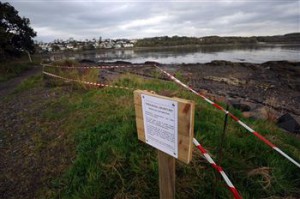
DALGETY Bay could be at risk if radioactive particles are not removed from its beach, environmental experts say.
Over recent months, the Scottish Environmental Protection Agency (SEPA) has found high levels of radiation in the area and now believe they have detected another radioactive source.
SEPA say the source appears to be buried underground and will require a specialist team and equipment to remove it.
They rear that erosion could expose the source over the winter, putting the local community at risk.
At a recent meeting, SEPA concluded that “there appears to be a number of caches of contamination which could be managed to prevent their release into the environment.”
The foreshore at Dalgety Bay has already been closed to the public following the discovery of a lump of radioactive metal last month.
Experts say it was 10 times more radioactive than any material found at the site previously.
Radioactive material was first found on the beach in 1990 and is thought to come from radium-coated instrument panels from military aircraft. The panels were incinerated and used as landfill at the end of World War II.
Since then, the Scottish Environmental Protection Agency (SEPA) has regularly monitored the area and removed any material they found along with the Ministry of Defence.
However it has since been revealed that the material is so toxic that MoD scientists refuse to analyse samples from it.
They fear that handling material from Dalgety Bay in Fife could give them cancer.
Since September SEPA have removed more than 100 from near the footpath and from around the slipway of a local yachting club.
Surveys have shown the beach is being polluted by at least 100 particles a year, with SEPA experts believing that they are swept ashore from the headland by sea currents.
